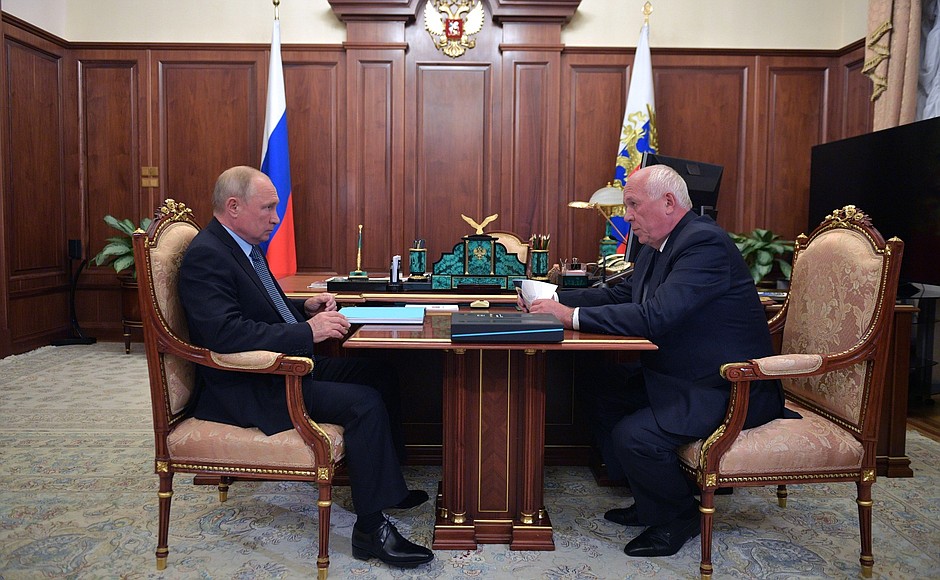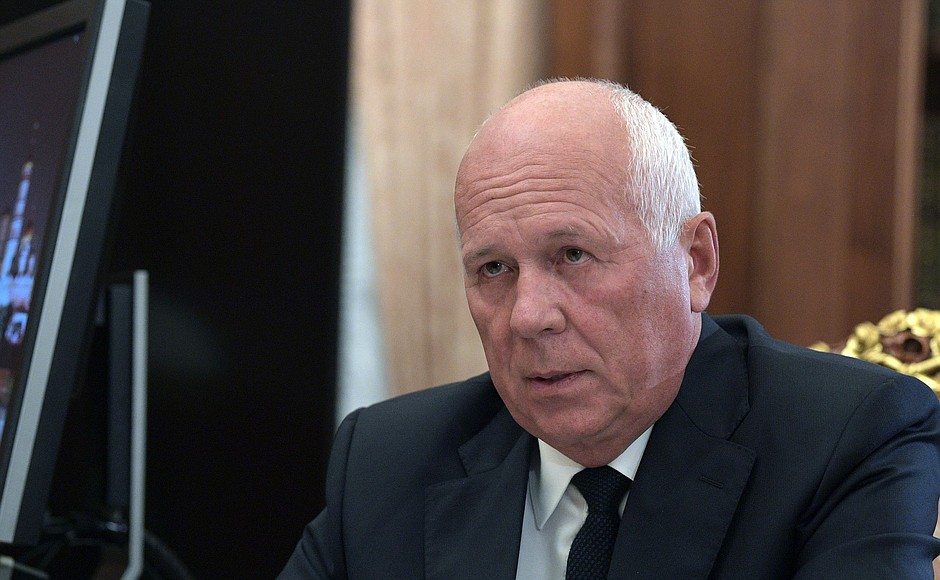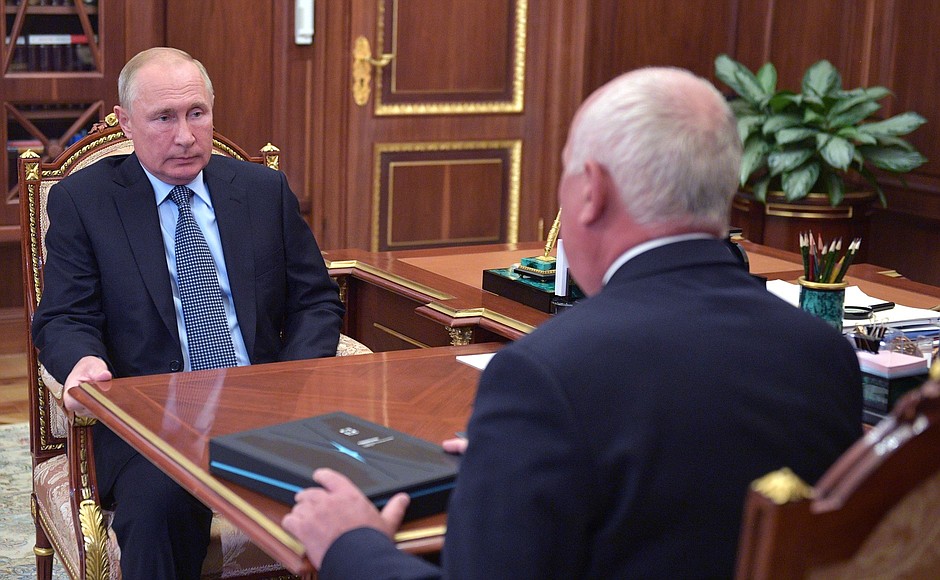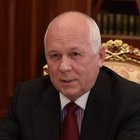President of Russia Vladimir Putin: Let us discuss last year’s results. Go ahead, please.
Rostec CEO Sergei Chemezov: In accordance with the law on corporations, I am to report to you on the 2019 performance of enterprises that are part of the corporation. We have prepared our annual reports: this one is purely financial, and the other one is general.
Starting my report, I would like, first of all, to cite some of our economic figures. In 2019, all of our businesses posted consolidated revenues of 1,771 billion, an increase of almost 8 percent on the previous year. I would like to note that this amount does not include intra-group turnover or revenue of enterprises in which the corporation does not have a controlling stake.
Our EBITDA and net profit margins have also increased; the EBITDA margin rose to 20.2 percent in 2019 from 17.9 percent in 2018. The consolidated net income margin was 10.1 percent in 2019, against 7.8 in 2018.
The state defence order contracts were completed on time. The contract execution rate was (for all contracts) almost 99.5 percent. Whereas in 2018 we had 26,220 contracts, in 2019 there were 29,170. The number has grown significantly, and the level of contract execution has, too.
As for our military technical cooperation projects, our portfolio remains at the level of 2018 with $51.1 billion. It is a large package, and it is the third year running that it has been at this level. We fulfil our contracts and then sign new ones. Products for the Air Force and air defence enjoy the highest demand.
We continue to increase the share of civilian goods, which currently amounts to 31.1 percent or 550 billion rubles in absolute figures. The growing revenue from the marketing of civilian products allows us to increase our financial stability and decrease direct dependence on state defence orders.
We are also increasing the output of medical items, which account for some 10 percent of the market, up from nearly zero only recently.
Vladimir Putin: In other words, your products on the domestic market…
Sergei Chemezov: Yes, they account for 10 percent of the market. It is noteworthy that we started manufacturing them only recently.
We can report positive results in the pharmaceutical sphere as well. The amount of imported vaccines on the Russian market has been reduced from 69 percent in 2015 to 17 percent in 2019. It is a major achievement.
Vladimir Putin: This is good.
Sergei Chemezov: We have also quickly increased the manufacturing of PPE, infrared scanners, contactless thermometers and other equipment we needed, including ventilators. At the beginning of the year, we produced only 60 ventilators a month.
Vladimir Putin: No, even fewer than that.
Sergei Chemezov: This is true. Today we turn out 3,000 ventilators a month, a 50-fold increase. I believe that we did not increase production 50-fold even during the war.
Since April 20, 2020, Roskhimzashchita has manufactured over 3.5 million special coveralls for infectious disease physicians.
The main subject of Rostec’s annual report for 2019 is research. The corporation’s companies completed 350 R&D projects last year and created over 200 innovative products and technologies.
Vladimir Putin: Have they completed all of them?
Sergei Chemezov: Yes, these are figures for the finished projects.
Our revenue from the marketing of innovative products is more than 700 billion rubles, a substantial increase from 573 billion rubles in 2018. The export of innovative products has earned us 310 billion rubles. We are now exporting innovative products. Total R&D spending amounted to 169 billion rubles, up from 108 billion in 2018. We have received 865 new patents, registered 570 know-how technologies and marketed 185 innovative products.
What are the most significant products created in 2019? First of all, it is Russia’s first ultrasound machine for diagnostics and therapy of neoplasia using focused ultrasound. The machine, called Diater, is used for non-invasive treatment of tumours by causing partial tissue rejection by means of focused high-intensity ultrasound. The procedure is practically painless and does not require general anaesthesia.
Last year we created the first Russian quadrivalent flu vaccine according to the World Health Organisation standards, the Ultrix Quadri. To develop this vaccine, we invested about 1 billion of our own money and raised loans and additional investments without asking for government funding. The first batches of the new vaccine were supplied to medical facilities in 2019. This cutting-edge drug contains four recent flu strains, which means patients can be vaccinated against four different viruses with one shot. We have vaccinated our employees as well as the Healthcare Ministry staff.
The next product is the Zenit automated laser surgical device. The equipment is used in aesthetic medicine and the treatment of several diseases. It has already passed state tests and is being used at medical facilities. It is fully automated. All the doctor or operator needs to do is set the programme, and the device actually performs the operation. Moreover, this equipment is 30 to 50 percent cheaper than the international analogue.
The next innovation is the Chance parachute system. It is a unique system that helps a person land from as high as 35 metres, which is the height of a nine-story building. It could be especially relevant for people who work or live in high-rise buildings, because if there is a fire, until now, we had no such rescue equipment that could evacuate people from high-rise buildings. The only possibility was helicopter, but it is not always possible. This new parachute can save lives.
What events in 2019 became the most significant for our corporation? First of all, we delivered eight Ansat helicopters. We established the National Air Ambulance Service, and these eight helicopters were delivered there for the first time. We are set to deliver 66 helicopters this year and in 2021.
Vladimir Putin: Do they perform well?
Sergei Chemezov: Yes, they are excellent. All Ansat and Mi-8 helicopters carry Russian-made medical equipment and provide all essential services to doctors and patients.
Two thermal power stations, Balaklavskaya and Tavricheskaya, started operating in Crimea. You and I attended the opening ceremony at one of these stations. This made it possible to completely meet the power demand of Crimea and its residents.
The first line of Russia’s largest waste processing facility was launched in Moscow Region’s Kolomna District, and it handles 650,000 tonnes of waste.
This made it possible to shut down the notorious 22-hectare Volovichi landfill site near Kolomna. The facility processes all this waste, and 50 percent is re-used by the industry or is recycled, including metal, glass, timber, plastic, paper, etc. Even foodstuffs are reusable: we turn them into compost used to grow lawns. Of course, it should not be used to grow edible crops, but it is quite good for lawns.
We have registered the first national pentavalent vaccine against diphtheria, tetanus, whooping cough, hepatitis B and Haemophilus influenzae. Earlier, such vaccines against five diseases were only available abroad, while Russia did not have them. We have now developed and registered the vaccine, and have started delivering it to clinics.
We have completed the delivery of S-400 Triumf air defence systems to Turkey ahead of schedule. It was the first contract of this scale signed with a NATO country; it is estimated at $2.5 billion. We are discussing a possible second delivery now.
Vladimir Putin: Did you complete the Tornado-S project last year as well?
Sergei Chemezov: No, we do not export the Tornado-S multiple launch rocket systems yet.
Vladimir Putin: Yes, I know. Was it in 2019 that you manufactured and delivered the system to the army?
Sergei Chemezov: Yes, this was in 2019.
Nearly all the trials have been completed, and we started delivering the systems to the army in late 2019 and early 2020. We have demonstrated them during the Victory Parade, and the results of the trials are quite good.
Rostec’s United Engine Corporation delivered 18 turbine engines to Gazprom in 2019 for the Power of Siberia gas pipeline.
We are now testing the self-driving Kamaz lorry. When you visited Kamaz…
Vladimir Putin: Yes, I saw it.
Sergei Chemezov: It is a landmark event for the automobile sector and our industry as a whole.
Vladimir Putin: Has it been tested beyond the plant’s territory?
Sergei Chemezov: Yes, it has. We will use it as the basis for manufacturing small lorries that can carry cargo on the territory of large corporations.
Vladimir Putin: They can be also used at quarries.
Sergei Chemezov: Yes, they can. But quarries need large-capacity lorries.
Rostec is also actively contributing to social and cultural projects, such as the Spasskaya Tower International Military Music Festival. It has become a good tradition. It is held on Red Square in Moscow.
Vladimir Putin: How many employees do you have?
Sergei Chemezov: Currently we have 590,000.
Vladimir Putin: This is a large group of people.
Sergei Chemezov: Yes, quite.
We also hold an international fireworks festival; it is a very interesting event. We had 700,000 spectators and another 2 million watched it online. We also organise the International Music Stars on Baikal Festival together with Denis Matsuyev, in which talented children take part as well. Denis selects them, and they perform alongside famous musicians.
We also hold various sports events, such as the Demin ski marathon in Rybinsk, Yaroslavl Region, a drone festival, and a boxing and power strike tournaments. The latter is called The Striking Ten and was attended by over 17,000 of our staff and employees of other organisations. Both men and women enjoyed hitting each other and striking the sack.
We support KamAZ-Master, the 16-time Dakar Rally champion, and soccer clubs – Arsenal in Tula and Baltika in Kalingrad, as well as the Dynamo Moscow women’s volleyball team, to name a few.
A few words about our company’s social policy. The average salary of employees and workers is 54,400, which is almost 10 percent higher than in 2018. This is much higher than the regional average. Our companies offer much better salaries. This is why we have the opportunity to select the best workers for our businesses.
Now about our social spending. We made 18,500 rubles in different payments for each corporation employee. These are expenses for medical services, travel vouchers, scholarships for training and material aid in difficult situations, to name a few.
We have launched housing and non-state pension programmes and maintain a high level of healthcare as part of the supplementary medical insurance.
We spent a total of 1.1 billion rubles on housing. These funds are allocated to employees depending on their salaries. The lower an employee’s salary, the higher the subsidy he or she receives. This is primarily aid to our young specialists. We want them to buy their own housing and to live on their own.
<…>



